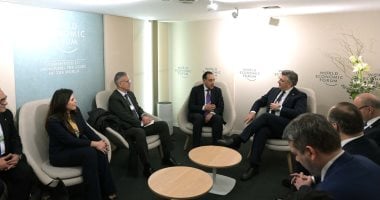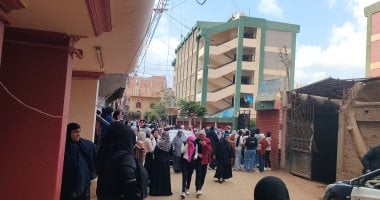انتخاب مصر رئيسا للمكتب التنفيذى لوزراء الاتصالات العرب والإمارات نائبا

Participants in the 28th session of the Council of Arab Ministers for Communications and Information, hosted by Cairo and organized by the Technical Secretariat of the Council of Arab Ministers for Communications and Information at the League of Arab States, agreed to elect Egypt as President of the Executive Office of the Council for the next two years, and the United Arab Emirates as Vice-President.
This came during Egypt’s presidency, today, Thursday, of the 28th session of the Council of Arab Ministers for Communications and Information, which is hosted by Cairo and organized by the Technical Secretariat of the Council of Arab Ministers for Communications and Information at the League of Arab States, where Egypt assumed the presidency of the current session of the Council from the United Arab Emirates, in At the beginning of the meeting, Talal Hamid Abdullah Belhoul, Chairman of the Board of Directors of the General Authority for Regulating the Telecommunications Sector and Digital Government in the Emirates, handed over the presidency of the work of the 28th session of the Council to Dr. Amr Talaat.
The meeting concluded with a number of recommendations, the most important of which is the launch of a unified Arab strategy for artificial intelligence within a strategic framework that all Arab countries adhere to in their work in the artificial intelligence industry.
The strategy aims to build Arab economies capable of contributing to the local and global output by adopting artificial intelligence technologies by enabling their individuals and institutions to make the most of it within a strict ethical framework.
The strategy includes several axes and areas of cooperation, including establishing integrated Arab rules and framework for the governance of artificial intelligence at the level of Arab countries, promoting the use and adoption of artificial intelligence and its applications in priority sectors in the Arab region, and developing a unified Arab framework for building human capabilities and developing public awareness regarding issues related to artificial intelligence. Empowering Arab entrepreneurs and startups in the field of artificial intelligence, partnerships and cooperation with leading regional and international entities and organizations in the field of artificial intelligence, and continuing effective and continuous support for the Palestinian people in various elements of the communications and information technology sector.
Positions were also coordinated on various issues related to communications and information technology, such as cybersecurity, artificial intelligence, postal services, and other active and important elements in the communications and information technology sector.
It was also agreed on unified positions regarding the Global Digital Charter issued by the United Nations, which countries agreed to at the Future Summit, last September, and the Arab Digital Cooperation Initiative, proposed by the State of Iraq, was approved.
It was also agreed on Arab work in the communications and information technology sector in the current year, based on 5 basic axes. It is represented in the Charter for Responsible Artificial Intelligence, stimulating innovation, entrepreneurship, and creative intellectual performance, a unified governance framework for protecting data and working to localize it within the Arab world, full cooperation in cybersecurity issues, building strong cyber dams for databases in our Arab countries, developing digital infrastructure, and narrowing the digital gap. In our Arab societies.
It was also agreed to form the Executive Office of the Council of Arab Ministers for Communications and Information for the next two years, with the membership of the United Arab Emirates, Bahrain, Tunisia, Algeria, Djibouti, Iraq, Saudi Arabia, and Egypt.
It was announced that the capital of the Hashemite Kingdom of Jordan, Amman, was chosen as the digital Arab capital for the year 2025.
In his speech during the meeting, Dr. Amr Talaat stressed that the current session reflects the firm commitment to building a joint Arab digital future, with communications and information technology as a supportive pillar in enhancing communication among Arab peoples, providing jobs for youth, driving the sustainable development of economies, and shifting towards secure digital societies. .
He said that the holding of this session coincides with the celebration of the eightieth anniversary of the founding of the League of Arab States. Pointing out that during the past two years there has been an unprecedented movement and transformation in the role of the communications and information technology sector on the international scene.
Dr. Amr Talaat referred to the “Global Digital Charter”, which was adopted by the United Nations last September, as an initiative to consolidate the principles of justice, sustainable development and governance in the technological space. Explaining that the Arab countries contributed to its formulation and participated in consultations to ensure its compatibility with their digital aspirations, especially in artificial intelligence and data governance. Expressing his aspiration for the continuation of this active Arab movement in the field of communications and information technology, to ensure the implementation of this charter in a manner consistent with our Arab vision and strategy.
Dr. Amr Talaat praised the efforts of the Arab Working Group on Artificial Intelligence, which culminated in presenting the “Unified Arab Strategic Vision for Artificial Intelligence,” which aims to improve government performance, benefit from artificial intelligence techniques in providing government services to citizens, and achieve leadership for Arab countries in the field of digital innovation. And start-up companies based on artificial intelligence, and raising public awareness of this extremely important technology, as well as encouraging research and development in applications based on artificial intelligence in various sectors, and attracting investments in the digital infrastructure necessary for this.
Dr. Amr Talaat reviewed the work plan for the current session, which embodies the hoped-for efforts of the Arab Council of Ministers for Communications and Information during the coming year, in whose work Egypt participates, along with its brothers in the Arab countries, on all its axes in order to enhance joint action in five very important axes.
He explained that the first axis is to adopt the unified Arab vision for artificial intelligence and establish a regulatory framework and governance fence that balances protecting our people from cyber and moral risks of artificial intelligence, while not excessively setting frameworks that restrict digital creativity, which requires the completion of the drafting of the Arab Charter for Ethics in Artificial Intelligence.
He pointed out that the second axis supports innovation and entrepreneurship in the field of artificial intelligence by creating a supportive climate for startups and entrepreneurs, providing encouraging incentives, and supporting inter-research and development for specialists in our countries through joint programs. In addition to investing in education, training, and developing digital skills, to ensure the readiness of future generations to compete in the digital labor market, Arab and global.
The third axis is Arab cooperation to establish unified data protection standards and policies that keep pace with global changes, to ensure respect for citizens’ digital rights, including their absolute right to manage their personal data and know the mechanisms for its circulation. This requires developing digital systems that allow interoperability between Arab countries safely and effectively, in addition to strengthening joint Arab action to localize data in the region, as one of the priorities of digital sovereignty issues and developing clear strategies to develop a digital infrastructure that stimulates private sector investment in local data centers and computing clouds.
He pointed out that the fourth axis is the continuation of Arab coordination and the unification of Arab initiatives that are planned to be included in the International Telecommunication Union plan at the Development Conference, which will be held this year in the State of Azerbaijan.
He explained that the last axis is to protect the digital infrastructure of our countries with advanced resilient cyber defense systems, and to develop regional strategies to protect data and confront cyber attacks, while developing regional mechanisms for cooperation in building capabilities and raising awareness in the field of cyber security to ensure a safe and stable digital environment.
Dr. Amr Talaat pointed to the active Arab participation on international platforms during the past year. Expressing his appreciation for the efforts of the Technical Secretariat of the Council of Arab Ministers for Communications and Information during the period between the current session and the previous session.
In turn, Talal Hamid Abdullah Belhoul, Chairman of the Board of Directors of the General Authority for Regulating the Telecommunications Sector and Digital Government in the United Arab Emirates, explained the most prominent achievements achieved during the last session of the Executive Office of the Council of Arab Ministers for Communications and Information, where more than 91 topics were discussed, in addition to 20 presented. A working paper in the fields of post and telecommunications, which directly contributed to reducing the Arab digital gap and promoting development in the telecommunications and postal sectors, in line with global goals and our future vision for achieving sustainable development.
In this context, the Assistant Secretary-General for Economic Affairs of the League of Arab States, Ambassador Ali Al-Maliki, indicated that the communications and information technology sector needs to pump more investments to develop infrastructure, bridge the digital gap between cities and remote areas, complete digital transformation processes, and develop human resources to work. With these technologies; He explained that the implementation of a regional development action plan for the Arab region has begun in cooperation between Arab countries and the International Office of the Universal Postal Union, which includes a group of projects; Calling for activating the adoption of the Arab digital agenda.
The Iraqi Minister of Communications, Dr. Hiam Al-Yasiri, called for the Council to adopt a number of proposals, including adopting the Arab Digital Cooperation Initiative proposed by Iraq, approving and adopting the Arab Strategy for Artificial Intelligence, and forming a committee to crystallize a unified Arab position that takes into account the various problems raised by global technology platforms to respect… The moral and social peculiarities of the region, providing technical support and expertise in the field of communications and information technology to Palestine, and joint Arab coordination in preparation for participation in the World Conference for the Development of Telecommunications, and holding Bilateral agreements to facilitate e-commerce applications between Arab countries, and the issuance of a joint postage stamp on the occasion of the 80th anniversary of the founding of the League of Arab States.
The Governor of the Communications, Space and Technology Commission in the Kingdom of Saudi Arabia, Dr. Muhammad bin Saud Al-Tamimi, stressed that this session comes as a continuation of the role of member states in enhancing Arab cooperation in the fields of communications and digital transformation, in line with the objectives of the joint Arab strategies. Noting that the Kingdom of Saudi Arabia launched the Riyadh Declaration during the Internet Governance Forum 2024, which focuses on artificial intelligence as a comprehensive and innovative dimension for finding digital solutions; He called on Arab countries to join the Riyadh Declaration as partners to establish efforts to enhance innovation and adapt artificial intelligence to serve humanity.
The Director General of Communications Affairs in Palestine, Hoda Al-Wahidi, called for strengthening Arab cooperation to support rebuilding the infrastructure of the communications and information technology sectors in Palestine, and to support and introduce fourth and fifth generation services to Palestine, allowing it to catch up with global technological development, improve access to international postal services, and guarantee Palestine’s rights to This area and adopting a mechanism to ensure the implementation of decisions issued by the Council in this framework.
The Minister of Communications Technologies in Tunisia, Engineer Sufyan Al-Hamisi, explained that the world is witnessing unprecedented technological transformations, as Arab societies, like the rest of the world’s countries, face great challenges in light of the digital revolution and transformations in the field of artificial intelligence and cybersecurity. Pointing out that these transformations provide opportunities to advance sustainable development and promote economic and social progress, but they impose complex challenges that require greater cooperation and coordination at the regional and international levels. Stressing the importance of strengthening joint efforts to build a safe and fortified digital infrastructure and exchanging experiences and practices between Arab countries.
The head of the General Authority for Communications and Informatics in Libya, Engineer Abdel Basset Salem Al-Baour, explained that the meeting embodies the Arab countries’ keenness to enhance joint cooperation in the field of communications and information technology in a way that serves the interests of our peoples. He explained that joint Arab cooperation in the field of communications and information technology has become a strategic necessity, especially since global technological acceleration imposes challenges that require strengthening the Arab digital infrastructure, securing data, protecting privacy, and developing human competencies capable of facing these challenges of digital transformation, artificial intelligence, and digital sovereignty.
The Minister of Communications and Digital Transformation of the Republic of Sudan, Engineer Adel Hassan Al-Hussein, indicated that the meeting comes as a continuation of the process of joint Arab action and the firm desire to unify efforts and goals to achieve a digital Arab society whose center is the citizen and its pillar is communications and information technology tools. Stressing the importance of strengthening conviction in the work axes adopted by major regional and international organizations, which include access to means of communications, information technology, infrastructure, services and data, maximizing the benefit of digital technologies and data, data-based innovation and providing relevant job opportunities; Explained
The importance of raising the efficiency of the digital information infrastructure as one of the most important axes of joint Arab action. Because of its importance in establishing the rules of the digital economy.
The head of the Telecommunications Regulatory Authority in the Hashemite Kingdom of Jordan, Eng. Bassam Al-Sarhan, praised the action plan presented by Dr. Amr Talaat, which anticipated the future and put things in the right direction. Adding that through its implementation, we will move into a new era of digital transformation in line with global requirements. Calling on Arab countries to attend the Global Arab Forum for Digital Transformation and Development next month; Expressing his aspiration to adopt Amman, the capital of the Hashemite Kingdom of Jordan, as a digital Arab capital by 2025.
للمزيد : تابعنا هنا ، وللتواصل الاجتماعي تابعنا علي فيسبوك وتويتر .
اكتشاف المزيد من العاصمة والناس
اشترك للحصول على أحدث التدوينات المرسلة إلى بريدك الإلكتروني.







